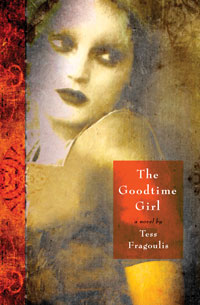Goodtime Girl's Greek adventure
Tess Fragoulis is an instructor in Concordia’s Department of English. Her novel, The Goodtime Girl, was recently translated into Greek. In early June 2013, Fragoulis travelled to Greece to promote the book. The text that follows is her personal reflection on what it meant to cross an ocean with her novel, and how a change in setting affected her understanding of her own writing.

Being in Greece, as a Canadian author of Greek descent who has written a book on quintessentially Greek topics — the destruction of Smyrna in 1922 and Rembetika, the Greek blues — posed a few challenges for everyone involved.
First of all, the publisher didn’t know how to classify the novel or what shelf to put it on: Greek literature or foreign? (I never got a definitive answer to where it ended up, but in Thessaloniki’s bus station bookstore it was rubbing spines with Greek Greeks.)
Journalists also had the expectation that I would be able to speak Greek. I do — like an interesting 12-year-old. I quickly learned that lowering their expectations resulted in many compliments about my command of the language of gods and philosophers.
That said, the television interview in Crete worried me the most, as I tend to make faces when I’m stumped. Miraculously, the pressure of the situation produced words that I didn’t know I knew, or had known once but had long forgotten: nickname, tickle. But for some reason, I could never remember “chapter,” a useful word when you’re discussing a novel. I remember it now, for whatever it’s worth.

Wherever I went — Crete, Athens, Thessaloniki — the reception was warm and welcoming, both for the novel and the Greek-Canadian woman who somehow managed to get things right: the history; the songs; the code of the tough guys of old, the rembetes, who haunted the docks, market and tavernas; the lives of the women, and even their wardrobe.
One elderly gentleman stated that I possessed “Greek consciousness,” while a younger man told me I had a “Cretan woman’s eye.” The latter apparently means that I understand Greek men. (For the record, I don’t understand Greek men, Cretan or otherwise.)
At every event I was asked the same question: Were Canadians interested in such an important part of Greek history? Yes, I replied optimistically, though many were not familiar with the tragic events of 1922, the great fire of Smyrna, or the deaths, destruction and refugee crisis that followed it and the music that arose from it.
The novel naturally has more immediacy for Greek readers, who are still mourning catastrophes, both old and new. In fact, it’s a bestseller there.

Writing The Goodtime Girl, then taking it to Greece, allowed me to sink into the collective arms of my perpetually melancholy people. When another writer read an excerpt from the Greek translation at a bookstore, I felt my face flush, and I choked back tears. It was as if I were hearing the story for the first time, written by someone else, in the language it was meant to be told.
Perhaps it was the work of my Greek alter-ego, the one with the Cretan woman’s eye.
About the author: Tess Fragoulis’ first book, Stories to Hide from Your Mother (Arsenal Pulp, 1997), was nominated for the Quebec Writers' Federation Best First Book Award. Her novel Ariadne’s Dream (Thistledown, 2001) was nominated for the 2003 IMPAC International Dublin Literary Prize and received an honourable mention for the Books in Canada/Amazon First Novel Award. She also edited Musings: an anthology of Greek-Canadian literature (Vehicule Press, 2004). She has published widely in literary journals and has also written for film, television, radio and newspapers in Canada and the United States. Her latest novel, The Goodtime Girl (Cormorant Books, 2012) is set in 1920s Greece and Asia Minor.
Related links:
• “Goodtime Girl goes to Greece” — NOW, May 8, 2013
• Concordia’s Department of English
• Tess Fragoulis on Wordpress
• The Goodtime Girl at Cormorant Books

